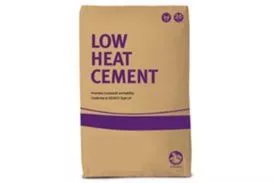
- General Product Name : Low Heat Portland Cement
- Product Category : Cement
- Compliance Name : BIS / ISI Certification
- Indian Standard : IS 12600
Low Heat Portland Cement (LHPC) is a specialized type of Portland cement designed to generate less heat during the hydration process compared to ordinary Portland cement (OPC). The heat generated in the early stages of cement hydration can be problematic in large concrete pours or mass concrete structures because it can lead to the risk of thermal cracking. LHPC is formulated with a lower percentage of tricalcium aluminate (C3A) and tricalcium silicate (C3S), which are the compounds responsible for the rapid heat generation in OPC. This reduced heat evolution results in a more gradual and controlled temperature rise during the curing of concrete, minimizing the potential for thermal stress and cracking. This makes LHPC an ideal choice for massive concrete structures like dams, bridges, and nuclear power plants, as well as in projects where temperature differentials need to be closely managed to ensure the long-term integrity of the concrete.
IS 12600, for Low Heat Portland Cement, is an important standard in the construction and building materials industry in applications where heat generation during the cement hydration process needs to be controlled. LHPC, meeting this standard, is designed to produce less heat during the setting and hardening process, minimizing the risk of thermal-related issues and ensuring the long-term stability of structures. IS 12600 sets specifications and requirements for LHPC, ensuring that the cement produced is of consistent and dependable quality. LHPC adhering to this standard provides builders and engineers with confidence that it will perform as expected and maintain structural integrity. Compliance with this standard is essential for cement manufacturers to export their products in India and maintain legal compliance.
Note: Foreign manufacturers of Low Heat Portland Cement are required to obtain the mandatory BIS/ISI Certification to export their products to the Indian market.
BIS/ISI Certification is an essential requirement for foreign manufacturers intending to export Low Heat Portland Cement to India. This certification, mandated by the Indian government, plays a pivotal role in ensuring that the cement meets the country's specific technical and safety standards, guaranteeing its quality, performance, and compliance with local regulations. Without BIS/ISI Certification, foreign manufacturers are legally prohibited from marketing or distributing their Low Heat Portland Cement in the Indian market. The certification process ensures that the imported cement adheres to stringent quality benchmarks, chemical composition requirements, and the capability to generate less heat during the setting and curing process. This feature is crucial for minimizing the risk of thermal cracking and ensuring the long-term structural integrity of construction projects.
The BIS/ISI Certification is a hallmark of product quality and safety in India, administered by the Bureau of Indian Standards (BIS). Established in 1987, BIS is a statutory body under the Bureau of Indian Standards Act 1986, responsible for setting, maintaining, and ensuring compliance with standards across various sectors. It upholds the legacy of the Indian Standards Institution (ISI), founded in 1947 and introduced the ISI mark as an emblem of quality. BIS continues this legacy by formulating standards and granting BIS/ISI Certification to products that meet the stringent quality and safety criteria defined by the organization. The Bureau of Indian Standards has been operating the Foreign Manufacturers Certification Scheme (FMCS) since 2000, as per Scheme-I of Schedule-II, BIS Act, 2016, and (Conformity Assessment) Regulations, 2018, specifically designed for foreign manufacturers. This scheme empowers international applicants and manufacturers to utilize the ISI Mark for exporting their products in India. The exclusive authority responsible for awarding the BIS Certificate for imports to foreign manufacturers is the Foreign Manufacturers Certification Department (FMCD). The primary objective behind BIS providing Manufacturing Certificates to foreign manufacturers is to ensure that the public in India has access to high-quality, safe, reliable, and risk-free products.
Complete your BIS/ISI Certification process by following these steps:
Step 1: Application Submission
- Gather all required documents
- Submit documents and the Application Fee
- Receive the Application Number
- Scrutinize the Application within the specified time frame
Step 2: Query Raised (If any)
- Receive communication about any missing documents or non-compliance
- Respond within the given period
For more detailed information, please click here.
Here is the list of documents required for foreign manufacturers for BIS/ISI Certification in India:
● Main Application Form V - (View / Download)
(Primary factory and product category information)
● ISI Application Fee - (View / Download)
(Copy of Remittance / Payment Advice)
● In-House Laboratory Test Report
(Indicating product compliance with the relevant Indian Standard, conducted within one month)
For more detailed information, please click here.
Export Approval, powered by Brand Liaison, is a single platform solution for various product certifications and approvals in India. We are one of the leading compliance consultant that provide essential Indian certification services to manufacturers to export their products to India. Our services include:
- Comprehensive support for paperwork, testing, and guidance.
- Sample development meeting standards for complete conformity in testing labs.
- Detailed application preparation and timely query responses.
- Free license maintenance for 2 years.
Download Brochure
Process & Guidelines